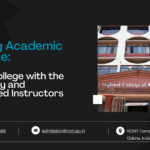Has this ever happened to you? You’ve studied hard for your test, but when you go into your exam hall, your head goes blank. As you sit down to begin the test, you notice your palms are sweaty!
College-level study naturally brings some degree of stress and nervousness. Stress and nervousness, especially, look to go hand in hand with academic exams. While some stress and a “slight case of nerves” are likely to always be part of anyone taking the test, getting too nervous can affect exam performance in a bad way. Being too nervous can impair memory and concentration, cause racing thoughts, cause “dropouts” and other distractions during the exam, as well as cause discouragement, among other things. In this blog, learn ways to manage anxiety before and during a stressful test.
Strong organizational skills and focus will help you schedule time to study for an exam well in advance. Starting too late and accumulating too much information before an exam is a common cause of anxiety. Here are some key strategies that will help you cope with stress and anxiety:
Clean Up Your Room and Your Desk:
Have you heard the saying: “A cluttered table is a sign of a cluttered mind”? This is scientifically correct. The more clutter around your workplace, the less you can focus on exam preparation. This is because your brain is bombarded with many distractions. Physical clutter overloads your brain and impairs your ability to think, leading to stress. So, you need to clear your desk and your room.
Learn And Apply Time Management Techniques:
A study involving students revealed that those who were taught time management techniques exhibited lower levels of exam-related anxiety than those who had not. Effective time management includes getting enough rest and getting a good night’s sleep, which makes you feel more energetic so you can focus while studying. Managing your time well helps you avoid feeling overwhelmed, so you will be less stressed.
Don’t Multitask:
Multitasking is bad for your health. It increases heart rate and blood pressure and causes stress. Multitasking may seem like an efficient use of your time but multitasking wastes time and reduces the quality of your work.
Take Mock Exams at Home:
One of the most common reasons for feeling stressed before exams is not knowing what to expect that day, such as the questions you are likely to be asked and the best approach to answering them.
By practicing, addressing your answers on a range of topics, including your favorite pluses and minuses, you can put yourself in a great position to show exam scorers what you know and ace even the toughest exam questions.
Improve Your Exam Time Management:
It is also common for students to worry about time management during exams. If you are worried about running out of time in the end and leaving questions unfinished or rushing through questions and finishing the exam too soon, practice, again, will help you tremendously.
When practicing mock exam questions, be strict with yourself about the timings so that you don’t exceed the amount you are allowed for the exam.
Reduce Your Phone Usage:
Research shows that excessive cell phone use not only causes stress but can also negatively impact your mental health. Staying off social media during exam time, as hard as it may be, will do wonders for your stress levels.
Checking out the latest updates on Instagram, Facebook, and co. while revising is the worst kind of procrastination as we all know how time flies when you swipe through your social feeds.
Getting Enough Sleep:
Young man asleep Bouncing through books for hours is tiring and not a good study habit. When it shortens your usual hours of sleep, research shows us that stress levels increase. Stress and sleep have a mutual relationship. Stress can make it difficult to fall asleep. It can even cause insomnia. At the same time, a good night’s sleep reduces the effects of stress.
Exercise and eat healthily:
Sometimes the thought of exercising when you are under a lot of stress may seem like the last thing you want to do, but we guarantee that you will feel better afterward. In fact, you may even have a little more energy to do another hour of revision if you feel up to it.
Exercise improves blood circulation and heartbeat. It’s a proven stress reliever because it fills your brain with endorphins, which are happy hormones. So, when you stop exercising, you may feel a lot more alert than before.
With all this practice, by the time you reach your exam, you will be a pro with timings and have a great idea of what kinds of questions to expect on the day. Just in case you didn’t believe us before, we hope you do know that you really have got this.





















2 Comments
I found a lot of points to remove stress, but I mostly used cleaning up the desk or cleaning my room. It helps me have a good thought process.
It’ѕ actually a cool and helpful piece of info. Ӏ am satisfied that you just shared this useful info with us.
Please kеep uѕ informed like this. Thank you for shаring.